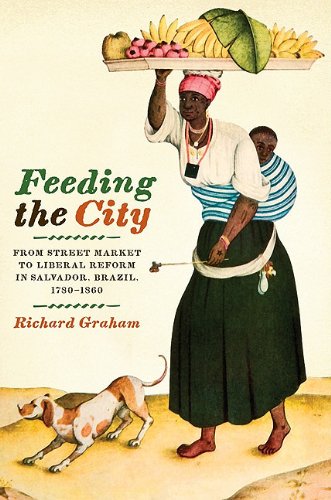Members of the History Department are always excited to hear what our graduates are doing. Wooster History students pursue interesting careers, and the longer I’m here, the more “Wooster connections” I find.
 I was catching up on some academic reading this week and turned to an interview in The Americas with one of the historians I most admire, Dr. Richard Graham. Richard Graham is Frances Higginbotham Nalle Centennial Professor of History Emeritus at the University of Texas at Austin. In addition to numerous edited volumes, he has published five books on Brazilian history. His most recent work Feeding the City: From Street Market to Liberal Reform in Salvador, Brazil, 1780-1860 uses food markets as a way to investigate Salvador’s larger social and economic hierarchies. In 2010, members of the Conference on Latin American History awarded Richard Graham the prestigious Distinguished Service Award in recognition of his many contributions to Latin American History. I use a chapter from his book Patronage and Politics in Nineteenth-Century Brazil in my Modern Latin American History class every spring, and it never fails to get students to think about the “theater of elections” in new ways.
I was catching up on some academic reading this week and turned to an interview in The Americas with one of the historians I most admire, Dr. Richard Graham. Richard Graham is Frances Higginbotham Nalle Centennial Professor of History Emeritus at the University of Texas at Austin. In addition to numerous edited volumes, he has published five books on Brazilian history. His most recent work Feeding the City: From Street Market to Liberal Reform in Salvador, Brazil, 1780-1860 uses food markets as a way to investigate Salvador’s larger social and economic hierarchies. In 2010, members of the Conference on Latin American History awarded Richard Graham the prestigious Distinguished Service Award in recognition of his many contributions to Latin American History. I use a chapter from his book Patronage and Politics in Nineteenth-Century Brazil in my Modern Latin American History class every spring, and it never fails to get students to think about the “theater of elections” in new ways.
But before all that, Richard Graham majored in History at the College of Wooster, graduating in 1956. In his Americas reflection on how the field of Latin American history has changed over the past fifty years, Dr. Graham even credits his experience at Wooster with insulating him from early knowledge of the sexism that predominated in academia in the 1950s and 1960s. Describing his experiences at the College of Wooster, Dr. Graham writes, “The head of the history department, Aileen Dunham, a first-rate teacher who kept up with the latest literature on European history, was a formidable person both in class and out of it. I was too naive and too unobservant to notice that as a woman with authority she stood out in America at that time.” Even though the College offered no classes on Latin American history in the 1950s, Dr. Dunham and her colleagues inspired Dr. Graham to pursue his career as a Brazilianist historian. I’m proud to be part of a department and an institution that nurtured a historian I so admire.
